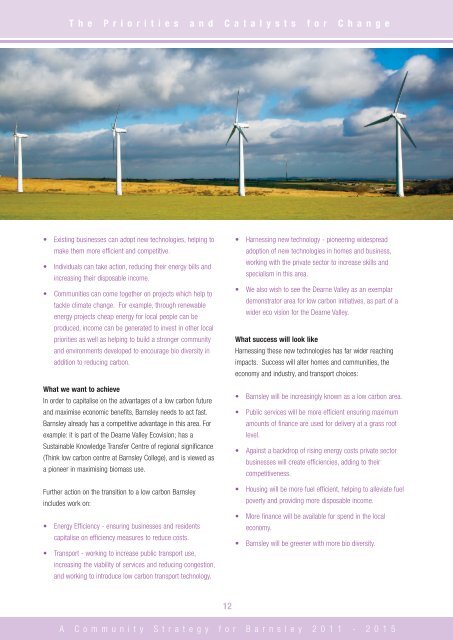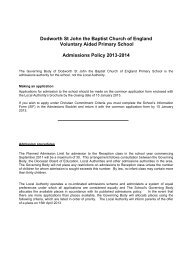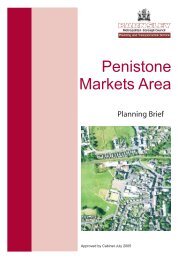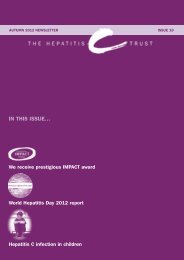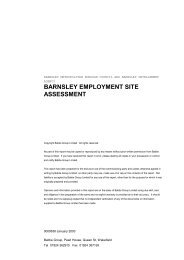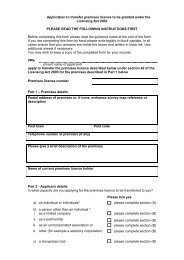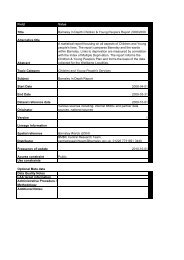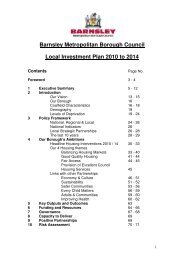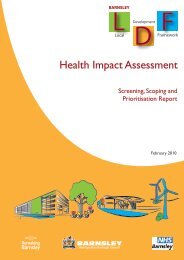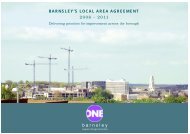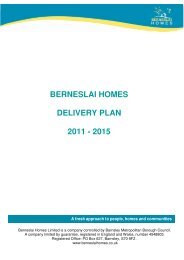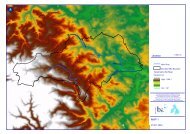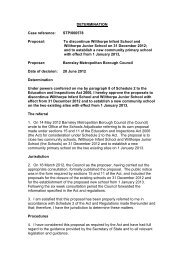A Community Strategy for Barnsley 2011 - 2015 - Barnsley Council ...
A Community Strategy for Barnsley 2011 - 2015 - Barnsley Council ...
A Community Strategy for Barnsley 2011 - 2015 - Barnsley Council ...
You also want an ePaper? Increase the reach of your titles
YUMPU automatically turns print PDFs into web optimized ePapers that Google loves.
The Priorities and Catalysts <strong>for</strong> Change<br />
• Existing businesses can adopt new technologies, helping to<br />
make them more efficient and competitive.<br />
• Individuals can take action, reducing their energy bills and<br />
increasing their disposable income.<br />
• Communities can come together on projects which help to<br />
tackle climate change. For example, through renewable<br />
energy projects cheap energy <strong>for</strong> local people can be<br />
produced, income can be generated to invest in other local<br />
priorities as well as helping to build a stronger community<br />
and environments developed to encourage bio diversity in<br />
addition to reducing carbon.<br />
What we want to achieve<br />
In order to capitalise on the advantages of a low carbon future<br />
and maximise economic benefits, <strong>Barnsley</strong> needs to act fast.<br />
<strong>Barnsley</strong> already has a competitive advantage in this area. For<br />
example: it is part of the Dearne Valley Ecovision; has a<br />
Sustainable Knowledge Transfer Centre of regional significance<br />
(Think low carbon centre at <strong>Barnsley</strong> College), and is viewed as<br />
a pioneer in maximising biomass use.<br />
Further action on the transition to a low carbon <strong>Barnsley</strong><br />
includes work on:<br />
• Energy Efficiency - ensuring businesses and residents<br />
capitalise on efficiency measures to reduce costs.<br />
• Transport - working to increase public transport use,<br />
increasing the viability of services and reducing congestion,<br />
and working to introduce low carbon transport technology.<br />
• Harnessing new technology - pioneering widespread<br />
adoption of new technologies in homes and business,<br />
working with the private sector to increase skills and<br />
specialism in this area.<br />
• We also wish to see the Dearne Valley as an exemplar<br />
demonstrator area <strong>for</strong> low carbon initiatives, as part of a<br />
wider eco vision <strong>for</strong> the Dearne Valley.<br />
What success will look like<br />
Harnessing these new technologies has far wider reaching<br />
impacts. Success will alter homes and communities, the<br />
economy and industry, and transport choices:<br />
• <strong>Barnsley</strong> will be increasingly known as a low carbon area.<br />
• Public services will be more efficient ensuring maximum<br />
amounts of finance are used <strong>for</strong> delivery at a grass root<br />
level.<br />
• Against a backdrop of rising energy costs private sector<br />
businesses will create efficiencies, adding to their<br />
competitiveness.<br />
• Housing will be more fuel efficient, helping to alleviate fuel<br />
poverty and providing more disposable income.<br />
• More finance will be available <strong>for</strong> spend in the local<br />
economy.<br />
• <strong>Barnsley</strong> will be greener with more bio diversity.<br />
12<br />
A <strong>Community</strong> <strong>Strategy</strong> <strong>for</strong> <strong>Barnsley</strong> <strong>2011</strong> - <strong>2015</strong>


